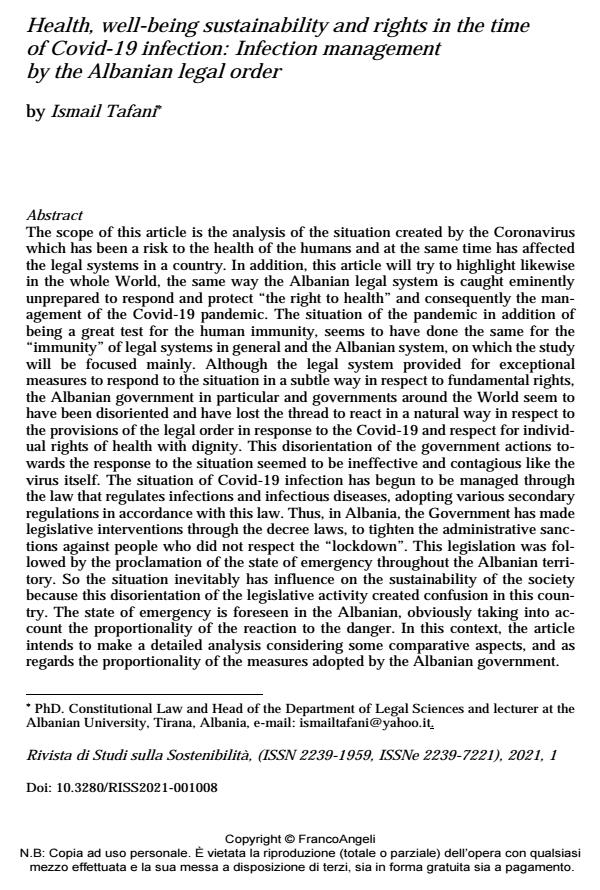Health, well-being sustainability and rights in the time of Covid-19 infection: Infection management by the Albanian legal order
Journal title RIVISTA DI STUDI SULLA SOSTENIBILITA'
Author/s Ismail Tafani
Publishing Year 2021 Issue 2021/1
Language English Pages 17 P. 133-149 File size 78 KB
DOI 10.3280/RISS2021-001008
DOI is like a bar code for intellectual property: to have more infomation
click here
Below, you can see the article first page
If you want to buy this article in PDF format, you can do it, following the instructions to buy download credits

FrancoAngeli is member of Publishers International Linking Association, Inc (PILA), a not-for-profit association which run the CrossRef service enabling links to and from online scholarly content.
The scope of this article is the analysis of the situation created by the Coronavirus which has been a risk to the health of the humans and at the same time has af-fected the legal systems in a country. In addition, this article will try to highlight likewise in the whole World, the same way the Albanian legal system is caught em-inently unprepared to respond and protect "the right to health" and consequently the management of the Covid-19 pandemic. The situation of the pandemic in addition of being a great test for the human immunity, seems to have done the same for the "immunity" of legal systems in general and the Albanian system, on which the study will be focused mainly. Although the legal system provided for exceptional measures to respond to the situation in a subtle way in respect to fundamen-tal rights, the Albanian government in particular and governments around the World seem to have been disoriented and have lost the thread to react in a natural way in respect to the provisions of the legal order in response to the Covid-19 and respect for individual rights of health with dignity. This disorientation of the gov-ernment actions towards the response to the situation seemed to be ineffective and contagious like the virus itself. The situation of Covid-19 infection has begun to be managed through the law that regulates infections and infectious diseases, adopt-ing various secondary regulations in accordance with this law. Thus, in Albania, the Government has made legislative interventions through the decree laws, to tighten the administrative sanctions against people who did not respect the "lock-down". This legislation was followed by the proclamation of the state of emergency throughout the Albanian territory. So the situation inevitably has influence on the sustainability of the society because this disorientation of the legislative activi-ty created confusion in this country. The state of emergency is foreseen in the Al-banian, obviously taking into account the proportionality of the reaction to the danger. In this context, the article intends to make a detailed analysis considering some comparative aspects, and as regards the proportionality of the measures adopted by the Albanian government.
Keywords: health right, law order, infection Covid-19, democracy.
Ismail Tafani, Health, well-being sustainability and rights in the time of Covid-19 infection: Infection management by the Albanian legal order in "RIVISTA DI STUDI SULLA SOSTENIBILITA'" 1/2021, pp 133-149, DOI: 10.3280/RISS2021-001008